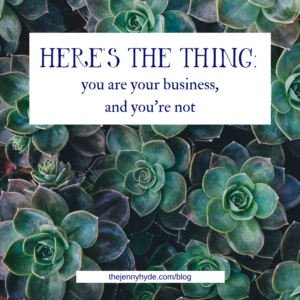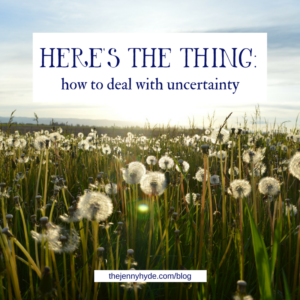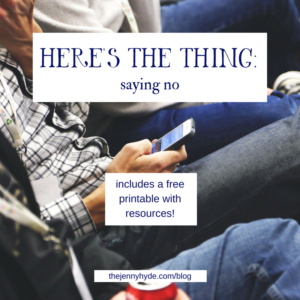 I’ve believed for a while that most of us creative entrepreneurs and makers and writers and designers and photographers and coaches etc are our businesses. We run personal, whole-hearted, authentic businesses that have personal brands (or brands with a highly personal touch) and that, in many ways, we are inextricably linked to our business.
I’ve believed for a while that most of us creative entrepreneurs and makers and writers and designers and photographers and coaches etc are our businesses. We run personal, whole-hearted, authentic businesses that have personal brands (or brands with a highly personal touch) and that, in many ways, we are inextricably linked to our business.
But there’s a counter-argument, a koan-like opposite that I also hold true: our worth as humans is separate from the external success or failures of our businesses.
When we create businesses based on our unique personal talents, they are so closely linked to who we are, how we feel, how we express ourselves, and how confident we are. That’s part of their power: that the business is close to our own power.
But creating such a tight bind between self to business and business to self can be damaging to both.
Because when you’re not seeing sales, does that mean you, as a person, are not worth money (and love and attention and care and more)?
Does negative feedback mean that you’re damned for all eternity as a person, as well as a business?
And does a successful business month or year mean that you’ve won at also being a friend, partner, sister, parent, human? Not necessarily.
You are your business
You’re the life force that created your business. You’re the mother – you birthed it into the world with the vital elements required for it to live.
Your wellbeing, the care of your heart and mind and soul and body, has a direct impact on how well you are able to continue putting love and life and care and wisdom into your business.
You are the place where the buck stops. You ultimately make the key decisions of your business. You are powerful. You’re the queen and the king and the boss of your business.
I am utterly convinced that, for the majority of us, starting a business and managing a business and continuing a business is a process that magnifies the nuances of our personal strengths and weaknesses. Your beliefs about money, rest, hard work, self-care, other people, boundaries, entitlement, connection and so much more are out in the arena for you to battle with.
If you had an underlying belief, perhaps secret even to you, that people are inherently judgemental and mean, this will become clear as you work with people, sell to them, and connect with them. It might become clear because you suddenly don’t want to show up anymore, or that your internal dialogue condemns all your critics as the mean, nasty teacher you had at school.
I say this not to put you off, or to imagine that you’re the only one. That example in the paragraph above, that’s one of mine. Of course, I don’t 100% believe that people are inherently judgemental and mean. I have a lot of evidence that people are kind and generous and supportive and creative and sometimes just plain ambivalent. But somewhere along the way, this darker belief surfaced, too. The one that leads me to hide away for weeks at a time and not put myself out there.
And in order to be successful in business, I have to work with this belief, and many more like it, in order to have a functional, thriving, successful relationship with marketing and managing my businesses.
This is what I mean: our beliefs will shape at least some of the success (or not) of our business.
You are not your business
You, the person, are already whole, worthy, and amazing.
You are allowed to be happy, to rest, to love yourself, to be loved by others, even if you haven’t made a sale or done everything on your list today.
You are bigger and more complex than a business. You are heart and mind and body and soul. You get cold and hot. You feel more emotions than any non-human entity. You get tired and you get inspired. You have instincts and dreams and desires.
You and your business are separate, like lovers or partners or friends. You give to your business, and you receive something in return. Your business gives to you, and you have the gratitude and energy to give back. (When you’re in a functional relationship, that is.)
Your business may not survive without you if you took your love and energy and attention away from it right now. But you would survive without it.
There is part of you – even if it feels very small and invisible – that does not rely on your business being successful in order to survive. It doesn’t need you to make five figures this month or gain 15k followers on Instagram. It doesn’t even need you to break even. This part of you is already whole and worthy of love and belonging, no matter what happens.
Celebrate your successes, by all means! It’s incredible what you’re putting into the world. Every product published, every sale made, every glowing review deserves a little toast of a cup of tea and piece of gratitude. You did it! You put it out there. And it paid off.
But please, oh please, watch the belief that one failure, one negative piece of feedback, or even a million of both, means that you are failure.
You are separate.
The personal and professional balance
In order to do the work we’re called to do in the world, the creative work, the heart-centred work, the personal business work, we have to take care of our own minds and bodies and hearts. We have to take care of the human at the heart of the business.
For many of my clients and retreat-ers and friends, it is immensely helpful to hear that self-care has to be part of their business plan for long term, sustainable business. That they are very much linked to their business success on that energetic level.
That means self-care: rest, nourishment, nurturing, exercise, healthy environments to work in.
It also means self-development and awareness: investigating the beliefs and re-writing the things that hold you back. Healing your relationships to money, hard work, receiving, creativity and more. An example: do you believe that you’ll somehow ‘use up’ all your good ideas? This is proven not to be the case, but many creatives believe that they won’t find the next big thing ever again. To quote Maya Angelou: “You can’t use up creativity. The more you use, the more you have.”
It’s also vital to see that you’re in relationship with your business. And like any relationship, to be healthy, you need good boundaries, good give and take, and good communication.
So here’s the thing
This balance, this dichotomy of being connected and separate from our businesses is the heart of my work. These beliefs and approaches and ideas are what I bring to one-on-one coaching and mentoring, as well as to my retreats, courses and workshops.
I can’t shy away from it any more. That part of me that believes everyone reading this is judgemental and mean and will think I’m totally crazy? I’ve got that part in check. I’ve chatted with her, figured out that she’s trying to keep me safe, and these days, I can keep her happy enough to get myself out there with these ideas about working with the human within the business for success all round.
If this isn’t for you, I understand. Possibly time to find another business coach or mentor to follow.
If this intrigues you, if you feel your heart or soul or body or some small part of you yearning for care and balance and coming alive and intuition, then perhaps working with my one on one or a workshop or retreat is something you’ll consider.
Let’s find our true path, within and separate from our businesses.
Jenny xx




